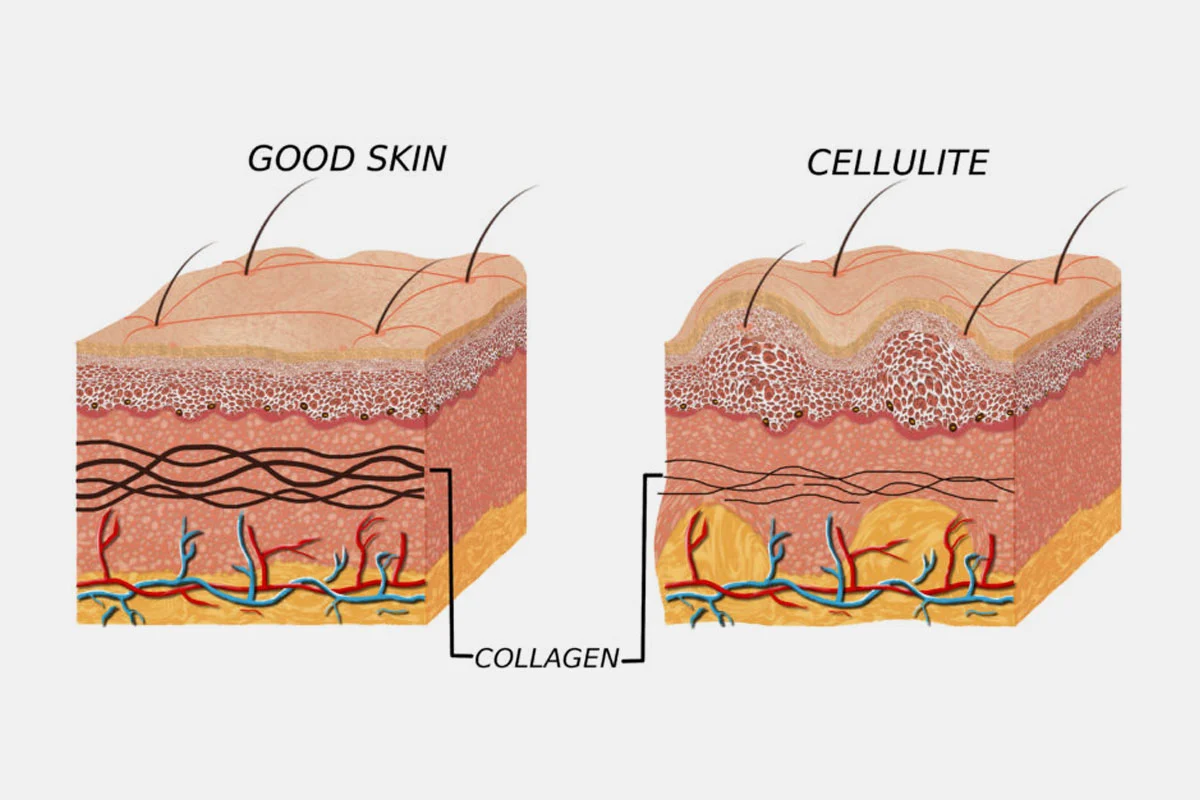A lot of people spend a lot of time and money trying to get rid of cellulite.
Some try to exercise it away—and that’s always a good thing to do for the overall health of your body—even if it doesn’t completely improve the appearance of cellulite.
Others try to liposuction it away—but that can be painful and expensive, and it doesn’t get to the root cause of cellulite. (Liposuction can get at some cellulite, but because the procedure is really aimed at removing fat from deep within the body, it actually misses most of the skin layer where cellulite resides.)
There are new laser cellulite removal procedures that appear to be more effective than liposuction, but again, that’s surgery (at least of a sort), and it takes several costly sessions to get noticeable results (think 3 to 4 sessions at around $1,200 a pop).
Then, of course, there are the tens-of-millions of dollars spent each year on topical creams that make outrageous claims about removing cellulite from the outside—which is not where cellulite resides!
So, with all of the confusion about how to get rid of cellulite, it makes sense to get some facts about this vexing problem that has the attention of millions of women (and yes, plenty of men, even if they won’t admit it).
What Is Cellulite?
Cellulite is one of those things that we know it when we see it. But what exactly is it?
Clinically speaking, cellulite is a fat globule under the skin that pushes the connective tissue out of shape, causing a dimpled, lumpy “cottage cheese” look.
And it happens to nearly everybody as they age.
Why?
Well, because as we age, our skin loses its elasticity—it stops stretching and starts rolling.
Now yes, cellulite occurs more often and more prominently in woman as they get older (and yes, there is a hormonal component to some cellulite formation).
And yes, being overweight does mean having more fat in general, which can lead to more cellulite formation. However, there are plenty of skinny people with visible cellulite too.
So, let’s all admit that cellulite can happen to anyone.
How Is Collagen Connected to Cellulite?
Health news these days is filled with the importance of collagen. Collagen is a great source of protein, and it doesn’t take much internet searching to see that bone broth is prized for its collagen content.
But did you know that collagen can help fight cellulite?
There are two reasons for that.
First of all, collagen works from within the body, where the cellulite is. It is not an invasive surgical procedure that goes hunting for cellulite. And it’s not a cream that you put on the outside of your skin. Collagen is true “beauty from within!”
Secondly, collagen strengthens the connective tissue of the skin. And as you’ll recall, cellulite is primarily a problem of fat pushing the skin’s connective tissue out of shape. Plus, collagen can help hydrate the skin from the inside. These two things add up to better skin elasticity, firmness, and plumpness (the good kind of plumpness).
What’s the Catch with Collagen?
So, more collagen means less cellulite, right? Not exactly. That’s because there are actually several types of collagen—16 to be exact.1
And while all types of collagen play a part in body composition, there are two type that play a vital role in skin health (as well as the health of hair and nails too): Type 1 and Type 3.
So, if you load up on those two forms of collagen, you’re all set on the cellulite control front, right?
Wrong.
Yes, getting more of those two collagen types from food sources such as bone broth will be helpful for skin health.
But as some very important research has discovered, there is an even better form of collagen when it comes to fighting cellulite: Bioactive Collagen Peptides.
Bioactive Collagen Peptides (BCPs) are a special form of collagen that has undergone a process called hydrolysis, which shortens the protein chains, thus enhancing bioavailability. This important difference between regular collagen and Bioactive Collagen Peptides makes all the difference when it comes to overcoming cellulite—as shown in a clinical study that looked specifically at using BCPs in oral nutritional supplements.2
Yes, you read that correctly—there really is a pill that can help fight cellulite.
So, if your goal is to have healthier looking skin and less visible cellulite—along with beautiful hair and nails—then you will want to consider finding a trusted source of Bioactive Collagen Peptides.
1 – Molecular Cell Biology (4th edition). Section 22.3 – Collagen: The Fibrous Proteins of the Matrix https://www.ncbi.nlm.nih.gov/books/NBK21582/
2 – Oral Supplementation of Specific Collagen Peptides Has Beneficial Effects on Human Skin Physiology: A Double-Blind, Placebo-Controlled Study. Proksch E., Segger D., Degwert J., Schunck M., Zague V., Oesser S. Skin Pharmacol Physiology, August 2013 https://www.ncbi.nlm.nih.gov/pubmed/23949208









